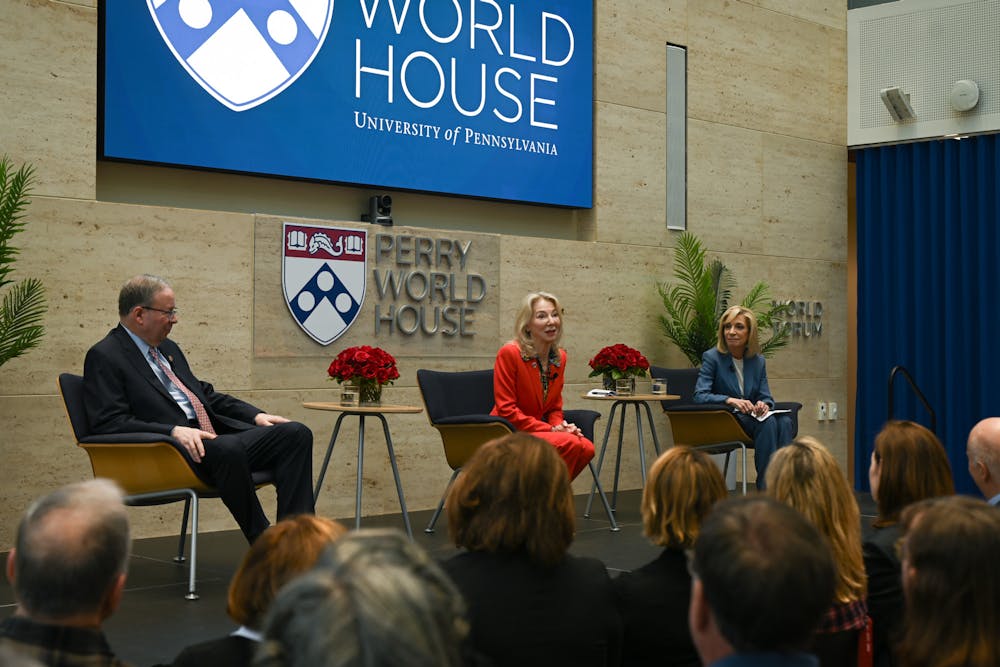
On Tuesday, former University Board of Trustees Chair and former United States Ambassador to Canada David Cohen and former Penn President and former U.S. Ambassador to Germany Amy Gutmann spoke at a “Common Sense Diplomacy” event about their experiences as diplomats and the importance of alliances.
The April 14 event, introduced by Penn President Larry Jameson and moderated by 1967 Penn graduate and founder of the Andrea Mitchell Center for the Study of Democracy Andrea Mitchell, took place at Perry World House. The discussion began with an introduction from Perry World House Deputy Director and Bess W. Heyman President’s Distinguished Professor of Philosophy Michael Weisberg, who alluded to recent policy decisions made by the Trump administration.
“Perry World House is Penn’s hub for global engagement, but very importantly for today, it’s one of the manifestations of Ambassador Gutmann’s vision and strategy to try to connect Penn to the world and the world to Penn, and at a time when the world is facing unprecedented uncertainty, having back Ambassador Gutmann [feels] like a reassuring … full-circle moment,” Weisberg said at the event.
The conversation began with a description of a diplomat’s unique role and discussed the experiences of the ambassadors present. Gutmann reflected on her years as U.S. ambassador to Germany from 2022 to 2024.
During that time, she was responsible for bringing former Benjamin Franklin Professor of Presidential Practice and former President Joe Biden’s intelligence about Russian President Vladimir Putin’s plan for an upcoming attack on Ukraine to German Chancellor Olaf Schulz. At the event, Gutmann said that she was “not subtle” in delivering this message because she understood the potential consequences of Germany not taking action.
“That’s part of what an ambassador does,” Gutmann added. “That’s what sometimes is called soft diplomacy, but it ends up with really hard results: military aid, humanitarian aid. Germany has become the largest home for Ukrainian refugees.”
She recognized the importance of allyship and asserted that the United States would not have the ability to effectively respond to “autocrats” without its allies.
Cohen similarly told a story of his time as the U.S. ambassador to Canada, noting the tension between the countries.
He discussed historical events dating back to the Revolutionary War between French Canadians and Americans. He connected this to Canada’s displeasure with 1968 Wharton graduate and President Donald Trump’s threat of annexing Canada as the 51st state.
“On my first tour through the Canadian Museum of History, I noticed there was a huge exhibit on the way in which Canada has organized itself to protect against [the] United States’ invasion and taking over of Canada,” Cohen said.
While acknowledging Canada as a current ally of the United States, he added that the tie may be severed by the Trump administration’s actions.
“The trust [between Canada and the United States that] had been built over 100 years [has] been broken by the Trump administration. … It took most of [Biden’s] entire four years to rebuild that trust … [which was] torn down in three months,” Cohen added. “But it just goes to show you the temporal nature of these things.”
Like Gutmann, Cohen stressed the importance of allyship between countries, calling it what “keeps the world together.”
He also reiterated the importance of alliances in preserving democracy against figures like “Donald Trump or Putin.”
“Alliance stands for democracy, freedom, equality, even diversity and inclusion, whether you’re allowed to use those terms or not, and it’s those values that were born here in Philadelphia,” Cohen said.
The Daily Pennsylvanian is an independent, student-run newspaper. Please consider making a donation to support the coverage that shapes the University. Your generosity ensures a future of strong journalism at Penn.
Donate







